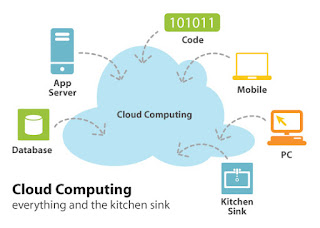Top cloud computing companies list.
Amazon - Amazon Web Services (IaaS)
The cloud computing company of Amazon.com : Amazon Web Service(AWS) provide Infrastructure-as-a-service(IaaS) offerings in the cloud for organizations requiring computing power,storage, and other services.
- Elastic Compute Cloud(EC2)
EC2 is a web service that allow resizable compute capacity in the cloud.The customers can create virtual machines (VMs)-that is ,server instances called Amazon Machine Image (AMI)- on which the customer can load any softaware of his choice.They follow pay-by-the hour system.
- Simple Storage Service(S3)
S3 provide a web service interface that can be used to store and retrived unlimited amounts of dat, at any time, from anywhere thru the Internet.
Google Cloud Computing Unit : App Engine
Google ZOHO

Google (SaaS,PaaS)
Google App Engine is Google's platform-as-a-service(Paas) offers building and hosting web applications on the Google Infrastructure.Currently Python and Java are the supported programming languages.App Engine is free up to a certain level of resource used.Fee is charged for additional storage, bandwidth, or CPU cycles required by the application.
Software-as-a-servive (SaaS) offers business email and collaboration.Its similar to the traditional office suits, includin Gmail, Calendar, Talk, Docs and Sites.
Microsoft Azure Service Platform(PaaS)
Azure Service Platform is Microsoft's PaaS offering an operating system called Windows Azure that serves as a runtime for the applications and provides a set of services such as:
.NET Services, SQL Services, Live Services
Microsoft - Cloud Computing

Rackspace (Cloud Hosting)
Is one of the premier cloud computing companies that leads cloud hosting. They serve over 10000 companies and many of the Fortune 100 companies come under this huge list. Their unique customer service strategy named - Fanatic support have helped them in gaining the trust of their clients. With the huge client commitment and state-of- the art technology. Rackspace is one good cloud computing company to invest in.
Proofpoint (SaaS,IaaS)
Proofpoint provides SaaS and IaaS services in the cloud related to securing the enterprise email infrastruture, with solutions .Proofpoint's solutions are priced on a per-user, per-year basis,depending on the product features.
RightScale(IaaS)
RightScale provides IaaS-Related services in the cloud to assist organizations in managing cloud deployments offered by other CSPs, including vendors such as AWS,FlexiScale, and GoGrid.The Rightscale Cloud Management Platform allows organizations to manage and maintain their cloud deployment through one web-based management platform.
Salesforce.com(SaaS,PaaS)
Salesforce is a provider of SaaS-based products, as well as having a PaaS offering, Force.com.
Sun Open Cloud Platform
According to Sun, the Open Cloud Platform is an open architecture and infrastructure encompassing technologies such as Java, MySQL,OpenSolaris, and Open Storage software.
Workday (SaaS)
Workday is a provider of SaaS-based hum resources and financial management products.Workday pricing is on a per-user basis and functionality.Workday's solutions are divided into serveral modules like Human Capital Management, Payroll, Worker Spend Management, Financial Management et cetra.In the collection of such companies the ones which provide Cloud Compuing in IaaS cloud are the most On-demand in the market today!




